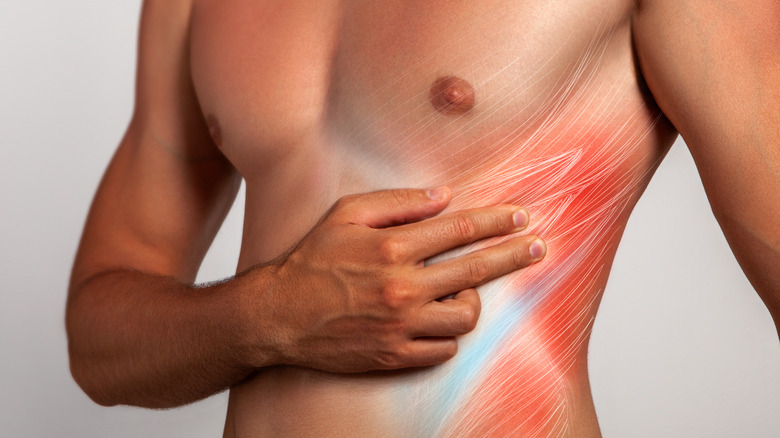Can A Muscle Strain Make It Harder For You To Breathe?
Intercostal muscle strains are a common cause of chest pain, with about 21% to 49% of musculoskeletal chest pain arising specifically from these muscles, according to Healthline.
The Mayo Clinic explains that a muscle strain is an injury to either the muscle itself or to the tendon that attaches the muscle to bone. The muscle or tendon may simply be overstretched or, in more severe injuries, it can be torn.
The intercostal muscles are those that are found between the ribs, says Kenhub. These muscles help support the rib cage and also play a role in breathing, helping with forced inhalation and exhalation.
According to the Cleveland Clinic, these muscles can become strained when you make certain sudden or repetitive movements. Strains are often caused by coughing; exercises or sports that involve repetitive movements, twisting, lifting, or stretching; injuries to the chest from a hit or fall; and twisting beyond your usual range of motion.
When muscle strains affect breathing
When you have a strained intercostal muscle, it can become inflamed, swollen, tight, or sore, says Healthline. In addition, the pain may worsen whenever you move the muscle, including breathing deeply, coughing, or sneezing. Since breathing is painful, the normal response is to begin to take smaller, more shallow breaths, which can lead to a feeling of being short of breath.
Dr. Janet Morgan, an internal medicine specialist, told the Cleveland Clinic that resting the injured area for 24 to 48 hours can help. If you have a cough, bracing the area with a small pillow can relieve the pain as well. Applying either ice or heat, depending on what seems to work best for you, may also help reduce the pain. Under the direction of your doctor, you may also use over-the-counter pain relievers like acetaminophen or ibuprofen. Finally, she says yoga may be helpful if approved by your doctor.
If these remedies aren't enough or your injury is taking a while to heal, your doctor may also try treatments such as ultrasound, ointments, emollients, or physical therapy, says the Cleveland Clinic. It notes that it may take four to six weeks to heal completely, even with medical assistance.
According to the Mayo Clinic, the best way to prevent muscle strains is to regularly do stretching and strengthening exercises. This will help prevent tight muscles from being injured.


